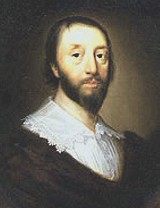| Profile | Major Works | Resources |
Sir Dudley Digges, 1583-1639

English Mercantilist, educated at Christ's Church, Oxford, went to become a businessman, politician and diplomat. An enthusiast of long-distance trade, Sir Dudley Digges was a director of the East India Company, an investor of the Virginia Company and helped finance Henry Hudson's final trip to America in 1610.
Digges's 1615 Defence of Trade was a response to the recent attacks on the East India Company by an "vknowne busie Person" (Robert Kayll). In particular, Digges insisted that the EIC had increased exports of English cloth, and that the "losses" to England's treasure by the importation of Indian spices and other goods were much exaggerated.
In 1618, Digges was appointed ambassador to Russia and later Holland. Digges was elected to the 1626 Parliament and joined the Puritan MP Sir John Eliot in pushing for the impeachment of King James I's favorites, the Duke of Buckingham and Sir Francis Bacon, particularly on the subject of the dispensation of royal monopolies and corruption. He continued his attacks in the 1629 Parliament of Charles I and Digges duly joined Eliot in his famous imprisonment. But Digges was soon reconciled with the king and made master of the rolls.
In 1631, Digges was appointed to a royal commission to oversee the reorganization of the Virginia colony (the company had gone bankrupt a few years earlier). His sons were Virginia colonists and one of them, Edward Digges, was even elected governor.
Digges's Compleat Ambassador, a posthumously-published tract, earned renown as a diplomat's handbook.
|
Major Works of Dudley Digges
|
|
HET
|
|
Resources on Dudley Digges
|
All rights reserved, Gonšalo L. Fonseca
